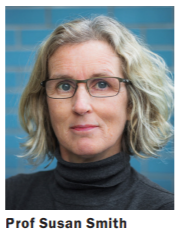Valerie Ryan speaks to the incoming Chair of General Practice at Trinity College Dublin Prof Susan Smith about
the requirement for a new GP contract and the myriad opportunities and challenges facing the specialty
A future GP contract needs to reflect the full work of general practice, the requirements of the practice team, and the changing landscape of the specialty, according to GP Prof Susan Smith. Next month, Prof Smith will become the Chair of General Practice at Trinity College Dublin. Speaking to the Medical Independent (MI) at the end of last year, Prof Smith said a revised GP contract would provide many opportunities for improving patient care.
She has seen the specialty evolve from being a reactive service with very little resourced chronic disease management, to a much more structured system dealing with a wide range of complexities and challenges.
Chronic disease management
“Obviously with the introduction of the new chronic disease management systems and the diabetes cycle of care, GPs are now very much at the centre of chronic disease management for patients across Ireland, which is really to be welcomed and mirrors what will be happening internationally. “The GP contract has not changed substantially to really fully reflect that, and we are still working on adaptations of our contracts from nearly 30 years ago.
“For the future, we would need to have a revised GP contract. Other countries have done this in recent years.” Looking ahead, within the overall context of the Irish health system and the shift towards care in the community outlined in Sláintecare, she stressed such a contract would be essential. Prof Smith outlined that a new contract needed to contain elements of structures of use for chronic conditions. At the same time, she highlighted that the chronic disease management programme was for GMS eligible patients.
There are people with complex healthcare needs who do not currently fit into that model of care or do not have one of the four conditions included in the programme (type 2 diabetes; asthma; chronic obstructive pulmonary disease; and cardiovascular disease). A key example of this is people with chronic mental health conditions. With the evolution of general practice, Prof Smith said GPs are in many ways working as generalist physicians and managing chronic conditions and acute presentations within these conditions.
She said GPs are interested in that role, liked the variety of work and had the necessary skills. But she pointed out that the increased complexity in prescribing and medicines management was a challenge. About 15 years ago, less than 2 per cent of the older population would have been on more than 15 medicines. Today, this is up at around 10-to-15 per cent or more, with over 20 per cent of people over-65 on 10 or more medicines.
The rise in complexity in general practice represents a huge challenge in terms of communication with specialists; managing multiple medicines; and assessing any inappropriate prescribing that could be taking place. Another issue concerns patient expectations. For instance, there has been increasing focus on early cancer diagnosis in recent times. While presentations can be straightforward, on many occasions they are not clear-cut, and there can be difficulties in distinguishing serious cases from the more routine. Prof Smith said this has never been an easy task, but that heightened expectations from patients have added to the challenge.
Training
MI asked Prof Smith if she sees a solution for the service as it faces an impending 700 GP retirements and ongoing workforce shortages. “The solution requires several different things,” she replied. “Obviously, we need to train more GPs and that is planned, but we really do need to ramp up training considerably to even replace existing GPs.
“If we are to increase the numbers of GPs to meet future demand, we also need to strengthen undergraduate exposure to general practice in medical schools. But this will require centralised support and resourcing so teaching practices are supported to provide longer clinical attachments in general practice settings.” She believes the issue is not just about the numbers trained, “but that we also need to attract the GPs who have gone abroad back into Ireland.”

Workforce changes
For newly emerging GPs, she said there is the need for more immediate measures. “There are lots of things we could do in the short-term… and one of them is to make current setting up in general practice much more attractive than it is. “It’s now nearly impossible financially to set up from scratch on your own because of such limited support until your list reaches a certain size; that’s something that could be looked at fairly immediately. And also that the [GMS] contract is very inflexible around part-time working.” Given the increasing complexity of the workload, the traditional number of face-to-face clinical sessions in general practice (Monday to Friday and Saturday morning) no longer seems sustainable.
What has emerged across the workforce is a move away from conventional careers in general practice, with an increasing number of GPs pursuing portfolio careers. Many GPs are developing or seeking careers with a mix of clinical and other interests. This could be a specialist clinical interest or parallel teaching, research or clinical/policy work within universities or bodies such as the ICGP. “There are some opportunities for other disciplines to do some of our work. But not as much as the Department of Health might hope because the work is quite complex, and certainly managing multimorbidity is something that you need a trained and experienced GP to do.
“But there are lots of elements of our work that can be completed by other colleagues like practice nurses or pharmacists, or physiotherapists; for example, managing muscular skeletal conditions. “We’re doing research looking at placing pharmacists into general practice and that has huge potential as well. A [new] contract could reflect that changing kind of landscape for general practice.”
As well as chronic disease management, Prof Smith said a new contract could, for example, incentivise annual or
six-monthly medication reviews for people on multiple medications, supported by a pharmacist.
Research
Prof Smith has been Professor of Primary Care Medicine at the RCSI for the past 10 years. Her research interests relate to the themes of primary care of patients with chronic conditions, with a focus on improving outcomes for patients with multimorbidity and medicines management. Prof Smith has been lead investigator on several Health Research Board (HRB)-funded randomised controlled trials in Irish general practice. She leads the HRB collaborative doctoral award in multimorbidity and is Associate Director of the HRB primary care clinical trials network of Ireland. She also has an interest in evidence synthesis with the Cochrane collaboration and is the Clinical Lead of the HRB collaboration in Ireland for clinical effectiveness reviews. She has been a board member of the ICGP and during that time served as Chair of the research committee.
During Covid-19, Prof Smith has supported the ICGP frequently asked questions service for frontline GPs. She also supported the HIQA evidence synthesis team, repurposed to provide rapid evidence synthesis to inform decision-making by the national public health emergency team (NPHET). She is a member of the Covid-19 expert advisory group, which provides ongoing advice based on available evidence to inform NPHET.
Health equity
Although optimistic for the future, believing general practice can adapt and move forward, Prof Smith was concerned at the slow pace of reform through Sláintecare. She said she was in favour of universal primary care (Prof Smith is a member of Doctors for Universal Healthcare), while acknowledging that not all GPs were necessarily supportive of such a change.
With her interest in health equity, she coordinates the Deep End Ireland group, which advocates for appropriate primary care services for socioeconomically disadvantaged demographics. “I believe all people should be entitled to see a GP based on need rather than their ability to pay. “We need to be considering our focus on our whole population. Until we have universal access to general practice, based on need rather than the ability to pay, that is going to be quite complex in terms of delivering services and care.”
Prof Smith believes the biggest block to progress currently was the shortage of GPs, but envisaged that this would stabilise in the future. She was not arguing for “overnight change” as it would not work “unless we do it carefully and have a clear plan of what we are doing. Sláintecare does represent that opportunity.” A significant issue for Prof Smith, and for many colleagues working in disadvantaged areas, is that there should be recognition of the workload and the level of multimorbidity involved with different patient groups.
“We have our new urban deprived GP grants, which is a modest first step, and it’s very welcome. It’s the first time that’s ever happened. But it is not going to deliver a system-wide response to the higher needs in more vulnerable populations. “But I would favour the model where GPs remain as independent contractors because I think that’s really valuable. It allows us to have governance and autonomy over our own actions.” Prof Smith considers it to be an efficient model where practices can respond very quickly to different local circumstances, which has been clearly shown throughout the Covid-19 pandemic.
Stating that general practice was a “fantastic career” that offered flexibility, variety, and intellectual challenges because
of the complexity, Prof Smith added that she would really encourage younger colleagues to consider it as a specialty choice.













Leave a Reply
You must be logged in to post a comment.